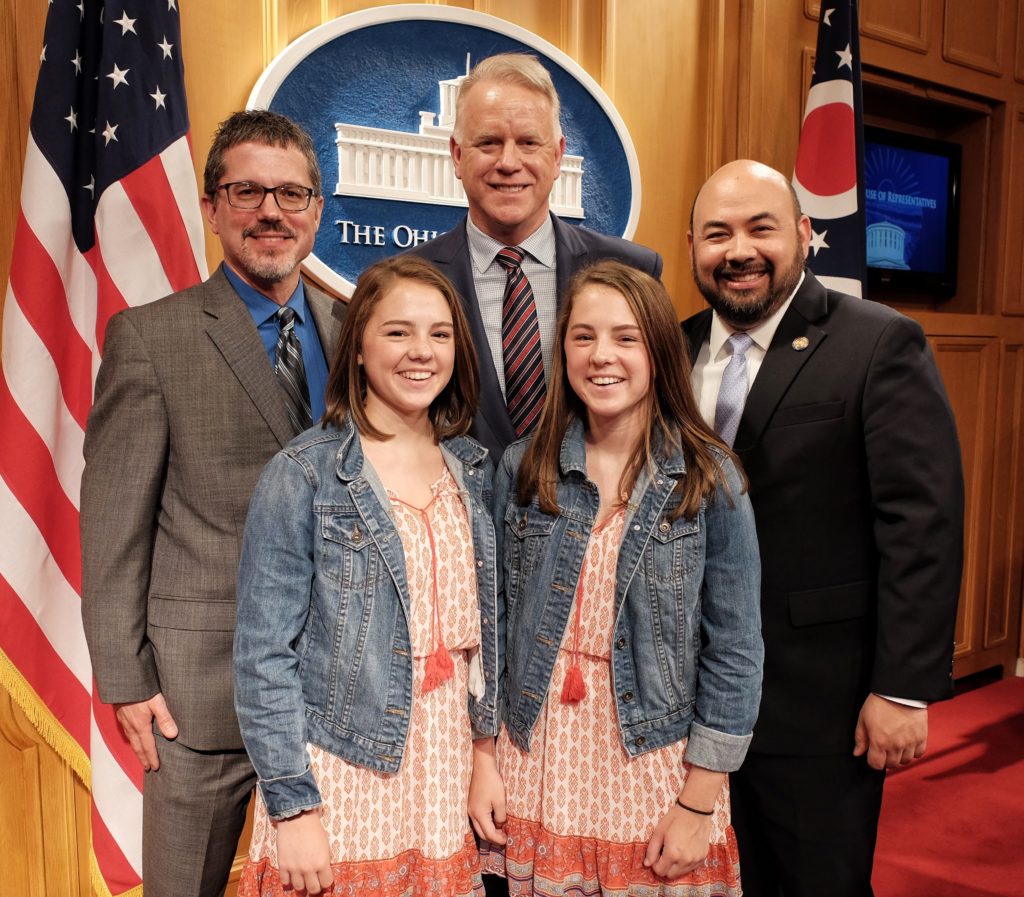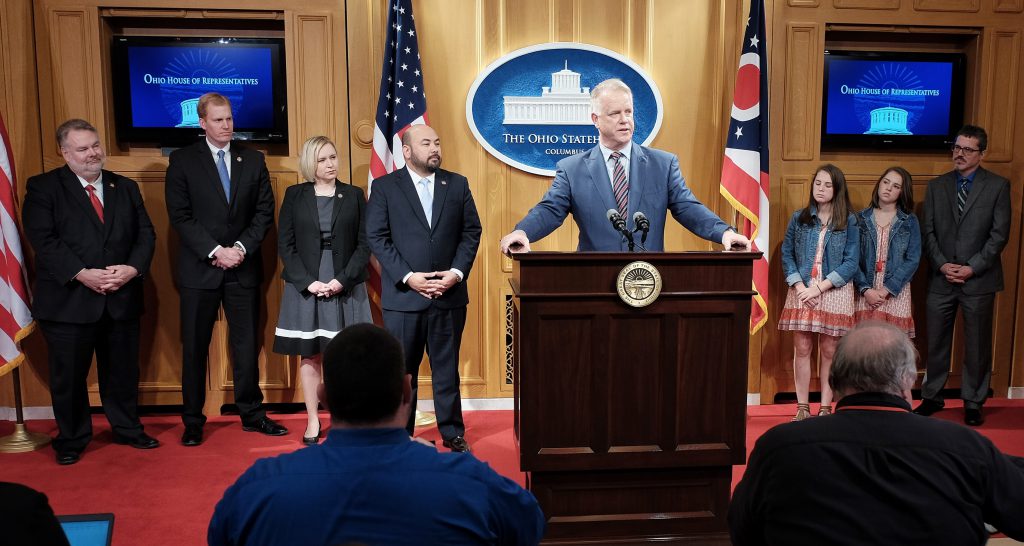House Republicans address BCMH funding

Left to right: Rev. David Hoffman, Alyson Hoffman, Boomer Esiason, Andrea Hoffman, Speaker Cliff Rosenberger
 COLUMBUS— During a press conference this week at the Statehouse, Ohio House Speaker Cliff Rosenberger (R-Clarksville) and several House Republican leaders joined former NFL quarterback Boomer Esiason and Reverend David Hoffman to discuss budget provisions regarding funding for the Bureau of Children with Medical Handicaps (BCMH).
COLUMBUS— During a press conference this week at the Statehouse, Ohio House Speaker Cliff Rosenberger (R-Clarksville) and several House Republican leaders joined former NFL quarterback Boomer Esiason and Reverend David Hoffman to discuss budget provisions regarding funding for the Bureau of Children with Medical Handicaps (BCMH).
In 2016, BCMH provided healthcare treatment for nearly 40,000 children with medical handicaps. The program also helps families meet the steep financial burdens that often accompany those treatments.
House Republicans announced plans to remove proposed changes to the way the program is funded that were included in the executive state budget plan.
Governor Kasich’s budget propasal shifted much of BCMH’s services into Medicaid, but lawmakers raised objections this might would leave a portion of currently eligible children out of the new program.
House Republicans did not sign off on this change, saying they wanted time in order to address these issues more thoroughly in the future.
“We feel it is important to ensure predictability and certainty for the families who are faced with trials and tribulations in their lives, such as cystic fibrosis,” Rosenberger said. “So our plan is to keep the current law in BCMH where it is. The reason we are making this change is so that we can continue to support individuals throughout Ohio that face these kinds of challenges.”
Boomer Esiason played 14 years in the National Football League, most as quarterback of the Cincinnati Bengals. He now co-chairs the Boomer Esiason Foundation, which brings together leaders in the medical and business communities to raise money, awareness and support for individuals with cystic fibrosis. During the press conference, he shared his experience of having a son who was diagnosed with cystic fibrosis 23 years ago.

“There is nothing more earth-shattering as a parent than to learn the news that your son or daughter is dealing with something so significant that it could end their life,” Esiason said. “There are families that are in need, middle-class families with hardworking parents, that need to make sure they have the certainty of care that they receive every single day. In terms of compassion, I believe that you really want to help those who are, not only less fortunate, but who are innocent victims of disease that need a hand up so they can have the same opportunities as everyone else.”
Reverend David Hoffman is a pastor at the Epworth United Methodist Church in Marion. He serves on several state and national boards that aim to improve the lives of individuals suffering from cystic fibrosis and special healthcare needs, as well as on the BCMH Parents’ Advisory Board. Hoffman is the father of 16-year-old twin daughters, Andrea and Alyson, both of whom have cystic fibrosis. Andrea and Alyson attend Pleasant Local Schools in Marion County and are active in track, cross country and soccer. They are preparing to run their third half marathon this October.
“Cystic fibrosis is a complex and costly disease,” Rev. Hoffman said. “We know as a family we can’t do this alone, and we rely on many others to help us in this fight, and the state legislature is part of the team. BCMH is that vital safety net that helps us make ends meet and keeps us afloat and working.”
House Finance Chair Ryan Smith (R-Bidwell) praised Boomer Esiason’s efforts to raise awareness and resources for such an important cause. “I admire people who are in a position to have the spotlight and use it for what they’re passionate about and really making a difference,” he said. “This effort is about doing what is best for Ohio families, and as we continue onward through the budget process, this will be a major priority and I think we are certainly moving in the right direction.”

State Representative Mark Romanchuk (R-Ontario) chairs the Finance Subcommittee on Health & Human Services and was among the leaders in the House working on the BCMH issue. “After listening to all the people who came before our subcommittee to testify, it became clear to us that this is something that we were not going to deal with in the budget,” he said. “In terms of sustaining the program, we intend to look at it more thoroughly outside the tight time constraints of the budget process.”









